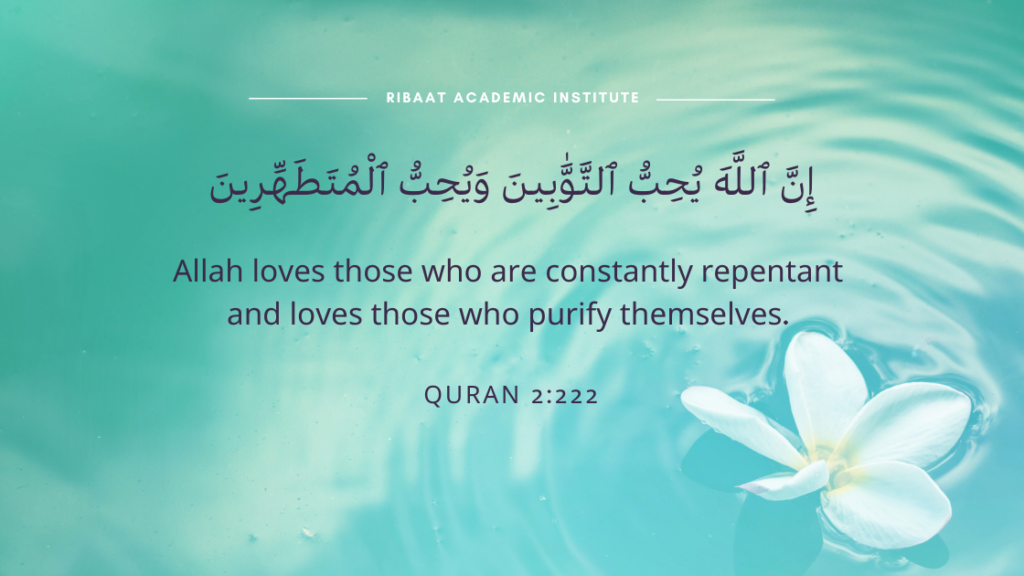Across centuries, cultures, and continents, the world’s major faith traditions have at least one thing in common: the use of water for purification. Purification rituals using water are seen in Islam in a number of ways, as well as in Judaism, Christianity, Buddhism, Hinduism, Baha’ism, and others. Purification rituals are commonly required before worship or after performing certain actions, particularly human acts such as eating, defecating, or having sexual relations. Certain body parts and bodily excretions, as well as sins, are also seen as needing purification.
The common thread is the attempt to bridge the gap between the physical and the spiritual. Because we are in essence spiritual beings, for a time confined to a physical presence in this world, there seems to be a natural inclination towards achieving purification from sin and from the base physical state in order to commune with the divine. In Arabic, natural inclinations are referred to as fitrah, and when something is observed as widely as purification is seen across the world and across history, it is referred to as fitrah. It is a natural feeling that drives humanity to reach a shared conclusion. Some matters of fitrah include the common understandings that stealing is a sin, murder is wrong, adults care for children, and humans are in need of purification. Interestingly, sins and purification are linked not only by fitrah but also in the Islamic understanding of purification. Sins require purification, and Allah loves those who repent from sin and those who purify themselves (al-Baqarah, 222).
In Islam, three types of purification are specified: purification of that which is physical, purification from a spiritual state of impurity, and purification of the heart and mind. Generally, water is the means of purification, with some other options in the case of water scarcity, injury, or illness.
Physical purity includes removal of actual, physical filth (urine, vomit, blood, feces, alcohol, and products of some animals depending on the school of thought).
Spiritual purity includes allowing water to flow over the body, some body parts, or an object or space. Purification from a minor state of impurity is called wudu, wherein one washes the face, arms, and feet, and wipes the head and ears. Purification from a major state of impurity includes washing the whole body.
Of course, there is much more detail involved and other considerations to keep in mind, and for this more study is needed. Fiqh courses generally address these issues and lay out the methods of purification.
Purification of the heart and mind is addressed in Tazkiyah courses, and explores the emotions, behaviors, and attitudes that render the “self” impure. This area of study includes the qualities of a believer, qualities of a disbeliever, and methods of identifying and treating diseases of the heart. It also addresses spiritual ethics and how to gain piety while living in the world in the manner of those who were and are beloved to God.
Purity is a spiritual state, but interestingly it is achieved by a physical process, demonstrating the way that these actions bridge the gap between the physical and the spiritual. Every drop of water carries sins away, washes them away and renders them forgiven. Spiritual beings like angels are made of light and are drawn to purified people and places. Conversely, shayatin are drawn to impure places and people. This is why purification is a requirement for some types of worship like prayer and Quran reading, and recommended for others such as dhikr and du’a. Beyond that, it is recommended to refresh your state of purity whenever it lapses, so that you remain in a state of purity at all times – protected, purified, and ready for worship always.
When I teach fiqh at Ribaat, I always have an assignment to maintain wudu for a full day and reflect on the effect of this exercise. Students have shared a variety of different responses, namely that they see immediate changes in their behavior. They find it easier to worship any time and to pray on time every time. They also found that they were slower to frustration, gossiped less, and used better language. One student shared that she found “wudu can affect us on a subconscious and emotional level and not just physical.”
I renew my intention, and I hope you will too, to walk with angels and be a person of light.
Eamaan Rabbat
Education Director
Rabata



